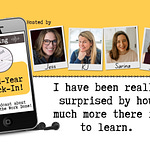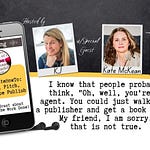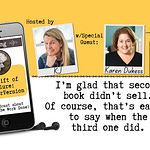It’s hard to start. It’s hard to finish. It’s hard to choose. Sometimes writers (especially those who have had to step back from a professional journalism job for family or other reasons) have all the ideas and in some sense, all the time to execute them, and the result isn’t wild productivity, but a frustrating spinning of wheels—because if everything is possible, how do you choose? What if you choose wrong? Everything looks like a shiny opportunity, but when you write the first few sentences, it turns out the shiny thing was just a gum wrapper.
It blows, and it can go on for a long time (and even forever)—because when you’re used to externally imposed topic and deadlines, it’s hard to shift into creating your own—and putting in the time you need to finish them and turn them into something real. KJ talks to former CBC national reporter and occasional freelancer Alison Myers about harnessing your strengths and the way you work best to get things done instead of starting and stopping a million things. Here’s what Alison said in her email:
Hello from Canada, the country that used to be known for being polite and apologetic but more recently seems to be inspiring people around the world to be horn-honking jerks.
You have no idea how relieved I was to hear you both talk about writing for an audience on a recent show. I used to be a big deal radio reporter before I had kids so I’m used to writing and performing for the sake of other people (i.e., feedback). I always stacked it up to what must be the raging dissatisfaction of my massive ego, that evil thing I'm supposed to suppress. As cliché as this sounds, you guys made me feel like less of an asshole for wanting people to read my words.
I have ideas coming out the wazoo and can write well when I commit to it. My problem is it has no purpose (read: audience). I have 52 untitled documents open with half-written essays that I haven't finished because I don’t know where this is all going. They’re like a million bowls of soggy cereal waiting for someone to pour them down the train. There’s no structure, no roadmap and, most importantly, no one on the other end waiting to receive.
Alison agreed to come on and talk through her version of Shiny Thing Syndrome (which manifests differently than the one Jennie Nash and I talk about here). There’s a LOT of useful stuff here about getting your writing habit started or restarted and how to get to where we all want to be—you know, butt in chair, head in game.
Links from the pod
Becca Syme episode, her website, Clifton Strengths
Jess and I on the “not today, muse” episode
Hugo Lindgrin, Be Wrong as Fast as You Can
Writers and Lovers, Lily King
The Menopause Manifesto, Dr Jen Gunter (read about her take on Goop here.)
@allmyinklings on IG
COMING JULY 1: It’s the #AmWriting Blueprint for a Book Challenge! 10 episodes, 10 guests, 10 weeks to you being ready to write your best novel, memoir or non-fiction book this fall. There will be homework. There will be deadlines. Complete all 10 weeks, and you could win a critique of that Blueprint from KJ or Jennie Nash—but you’ll already be a winner, because you’ll have a plan that will put you way ahead of the game. Play for free—or reserve an Author Accelerator critique for your finished product to hold your feet to the fire and make sure you do the work and get bonus episodes and write-alongs. Want details? Ready to sign up? CLICK HERE.
PS: Along those lines, Author Accelerator has opened registration for the 2022 Manuscript Incubator, an intensive, 7 month coaching opportunity that offers one-one-one support and guidance for novelists and memoirists planning to have a submission-ready project by early 2023—and includes the opportunity to have that project reviewed by a group of agents and editors when it’s ready. For more information, head to authoraccelerator.com/manuscript-incubator.













